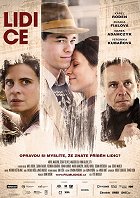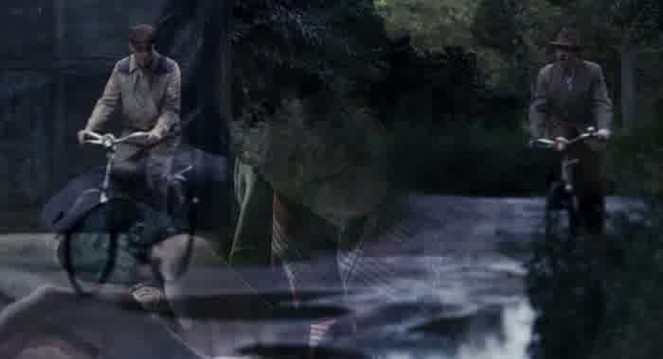Directed by:
Petr NikolaevScreenplay:
Zdeněk MahlerCinematography:
Antonio RiestraCast:
Karel Roden, Zuzana Fialová, Roman Luknár, Zuzana Bydžovská, Ondřej Novák, Norbert Lichý, Veronika Khek Kubařová, Václav Jiráček, Jan Budař (more)Plots(1)
The Lidice movie is based on the Zdeněk Mahler’s screenplay Nokturno, awarded by the Best unrealized screenplay award in the Czech Lion 2007. Maybe it is just the uniqueness of the movie topic, what made all film preparation so difficult. Thanks to helpfulness of some Czech companies and generosity of some Czech towns, can our dream come true. In 26th July 2010, the movie team could start the Lidice movie shooting. (official distributor synopsis)
(more)Reviews (6)
For those who want to watch two hours of an old national tragedy, it’s perfect. Otherwise, it’s a high-minded, long-winded, kitsch borefest that only works at the most basic level – the poor people of Lidice didn’t deserve to be murdered and Nazis are assholes; something we already know well without this two-hour long martyrdom. The only thing praiseworthy is Karel Roden’s performance and his storyline, which, considering the time it’s given, doesn’t play the main role, as it would deserve. I don’t want to downplay the real historical tragedy of Lidice, but I don’t know if there is any reason today to make a film about it, and if there is, certainly not one like this. 5/10
()
Deserving futility. It's a little sad that the intimate Fall of the Innocent story can't impress other than through Lidice itself as a symbol of genocide. But no wonder. The characters are empty, Mahler moves them around the chess board didactically, Riestra's camera fails to stabilize between theatrical stylization of the scene and realism, the film has absolutely no rhythm and the whole thing feels desperately unbalanced. If it doesn't go through the characters, some executions, fingernail scraping, baby hands behind the glass of a gas car... Pathetic, artificial, contrived. Fall of the Innocent is a classic school movie - to be impressed and not to think. The questions are missing, and the whole thing is written in the choppy notifying sentences. Protector's counterpoint. A film that, from my point of view, has no contribution to understanding the national past other than merit. The only really exciting scene is when Šíma is removed from the official version of history at the end. Sadly, even though Nikolaev's film had written him in there again, nothing fundamental happened.
()
History that doesn't hurt. It is not easy to create a film that contains one of the most painful wounds of Czech history and tempts us with emotional blackmail. But Lidice is ultimately neither a cold history lesson nor a weeping accusation of injustice. It is a successful film that tells this difficult story in a way that evokes emotions at the right moments, freezes at others, but never surpasses the bearable limit, which personally was the biggest surprise for me. Moreover, when it attempts to become the Czech Schindler's List in the end, one can only acknowledge that good Czech war drama exists in the world. And that is despite the fact that half of the work is done by the music and Roden.
()
I'm afraid I have found a counterpoint to Protector, even though The Butcher of Prague is an exemplarily different film. While the failure of Protector was in the spirit of a fake plot and a fake attempt to make a "different" drama with the assassination in the background, spiced up with fake acting performances and a remarkably odd work with the mass media culture of the time, in The Butcher of Prague we have the assassination again as a dysfunctional decoy on the background of the story of "real" people. Petr Nikolaev's film lacks the steady hand of a dramaturgist, so it splinters and splinters throughout the run time, finding no solid follow-up moments. It cuts time in a leisurely manner and although the prologue is already hinted at in 1939 and we meet the point (non-point) of the post-World War II days of 1945 at the end, the only consistent development concerns Karel Roden's Šíma. On the other hand, the story of the forger Kowalski (Mariusz Osmelak) with the whole absurd color of the prison system of that time is completely lost. The basis of the story of the gentlemen's cook played by Sabina Remundová is missing, and the same applies to the plot of the otherwise apparently very strong relationship between Šímová played by Zuzana Bydžovská and Vaňková played by Zuzana Fialová. Unfortunately, all the young actors, led by Kubarová and Adamczyk, and not ending with Šoposká, for example, fail completely. The introduction, which is supposed to show the story of the people from Lidice in all the basic nuances of everyday life, unfortunately resembles more so the attempts of the Czech TV film Rytmus v patách (Rhythm in the Heels) and unfortunately in some moments it reaches the level of a parody, which is reprehensible. The primitive casting, concentrated in the best-split roles exclusively on Slovak actors who already meet a certain foreignness in the first plan, also feels cheap. Roman Luknár appears next to Fialová as Vlček and together with Bydžovská and Roden, they form the only solid pillars of this uncoordinated fiacre. In anticipation of it and during the preparation of The Butcher of Prague, certain issues emerged, contrasting particularly with the tone of Herz's Habermann's Mill. I have to say that Nikolaev's final project really bit off more than it could chew. There is no difference between the official red tape of the Czech opportunist postmaster and the Lidice Nazi leaders, who are again just opportunist bureaucrats. The elite of the Third Reich is represented only by Heydrich in two insignificant sketches, who in this minimal space does not exceed a bullet point from an overview textbook. He is contrasted with a regular soldier who chooses voluntary death rather than participate in the transport of the Lidice children. Yet even this motive is not properly developed. Thus, in conjunction with the hypocrisy represented by the post-war artificially created human reverence, I do not find any sympathy with my own nation and again I only feel frustration with Czech nature.
()
(less)
(more)
It might be half a star more than it deserves, but I still have to give it full marks. I expected many things from Fall of the Innocent, but not that it would affect me this much. This is primarily due to Mahler's excellent screenplay, which is not extremely pathetic, it is easy to read despite the number of characters, it does not unnecessarily embellish anything... In short, it gives a really believable impression. Nikolaev's direction is, one could say, directly proportional to the script. Subtle for most of the duration, very strong in a few moments. The mood was definitely helped by the music (I really don't know why anyone minds that it plays almost all the time), the cinematography, which probably uses blue and grey the most of all the colors, and then of course the actors. Fall of the Innocent is certainly not a nice film. But it is a good film. And if I gave Habberman four stars, I have to push the envelope here. I still get chills from what I saw.
()
Lately, I have been trying to make up for my debt to Czech cinematography, but I wonder if it actually makes sense. "Lidice" was supposed to be a major film about an event that marked the darkest chapter in Czech history. In reality, however, it is a small film that focuses more on one individual and his suffering rather than the essence of history. I can think of a comparison. There are two kinds of films that can be made about tragic events. A credible one, which primarily does not play on emotions but still wants to pay tribute to those who did not survive. Such was the film "United 93". Then there is the second way to pay tribute - to make a tear-jerker that strives for nothing other than pathos. Such was the film "World Trade Center". And now, guess which group "Lidice" belongs to? The second one, of course. It tries to evoke strong emotions, which ultimately fails. The most interesting scenes are those from the prison, which theoretically should only be a side story. Karel Roden is in the forefront only because the film manages to hold up. He can handle it. The others are also good, but the whole thing is... It simply isn't something that would make me delve into the sadness of the fate of those poor people. When I read any description of the events, it probably affects me more. Pretentious artistic shots, blurred camera, and filming a herd of rabbits, that really doesn't get to me. The music wants to be grand, and so "Lidice" resemble bad spectacles like "Pearl Harbor". It's a shame. "Lidice" deserve more, in my opinion. Why avoid the harsh scenes and only film them halfway? Why not convey more of that suffering to the audience? I'm sorry it ended up like this, but this simply isn't something that captures the events as they were. It's just a game of grandeur that borrowed a horrific event from our history as a backdrop. More: http://www.filmovy-denik.cz/2012/08/parmeni-krysy-z-temnot-mi-4-blazniva.html
()

